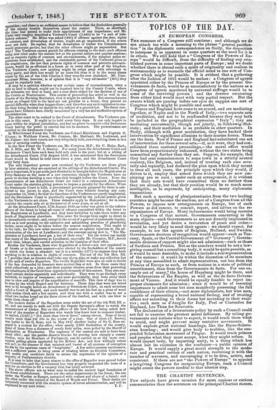TOPICS OF THE DAY.
AN EUROPEAN CONGRESS.
THE rumours of a Congress still continue ; and although we do not attach too wide a meaning to the phrase " general pacifica- tion " in the diplomatic correspondence on Sicily, the disposition to interpose is as apparent in some quarters as the need for it is in others. We still hold that a " Congress of the Powers of Eu- rope " would be difficult, from the difficulty of finding any esta- blished powers in some important parts of Europe ; and we doubt whether there is abroad such a spirit of originality and realism in statesmanship as to reconcile the official mind to one sort of Con- gress which might be possible. It is evident that a gathering after the fashion of 1815 would be useless : a Congress of agents appointed either by the Princes of Europe or by the present Go- vernments de facto, would be as unsatisfactory to the nations as a Congress of agents appointed by universal suffrage would be to some of the surviving powers ; and the decrees emanating from either kind would meet with very partial respect. But the events which are passing before our eyes do suggest one sort of Congress which might be possible and useful.
France and England have come to an accord, and are mediating together, at Naples and in the North of Italy,—two separate acts of mediation, and not to be confounded because they may both be included in the geographical expression "Italy"; they are mediating concurrently, though not jointly, in Schleswig-Hol- stein; and their mediation is as probable in other quarters. In Sicily, although with great moderation, they have backed their intervention by significant allusions to their marine forces. These are the facts. Now if France and England had substituted one act of intervention for these several acts,—if, as it were, they had con- solidated these scattered proceedings,—the moral effect would have been proportionately enhanced, without the two states being committed any further than they are. Suppose, for example, that they had sent commissioners to some town in a strictly neutral country, like Belgium, and, instead of treating each case seve- rally and topically, had declared the plan upon which they meant to treat all such cases, the principle upon which they would, if driven to it, employ that armed force which they are now em- ploying pro re nata : under such an arrangement, it is evident that their acts would have committed them no further than they are already, but that their position would be so much more intelligible, as to supersede, by anticipating, many diplomatic transactions.
But such a meeting of plenipotentiaries from the two leading countries might become the nucleus, not of a Congress from all the Powers, to impose new arrangements on Europe, but of such Powers as did concur, to consult, report, and advise on the re- organization of Europe. Many inducements would bring recruits to a Congress of that nature. Governments concurring in the main objects—such Governments as are not directly implicated in revolution, and yet desire a restoration of peace and order— would be very likely to send their agents : we should expect, for example, to see the agents of Belgium, Holland, and Sweden. Governments desirous of recognition would appear—such as Tus- cany, Spain, or the Central Government of" Germany "; Govern- ments desirous of support might also ask admission—such as those of Sardinia and Prussia. But as the conclave would be not a law- giving council but a consulting body, it would be quite possible, as it would be most desirable, to make it include a real representation of the nations : it would lie within the discretion of its members at any time assembled to admit representatives, not less from the Princes of Europe as such, or from nations in a state of political unsettlement, than from the Governments de facto. For one ex- ample out of many,: the house of Hapsburg might be there, and the Sclavonians of the Empire, as well as the de facto Govern- ment of Vienna. And it would be equally feasible to reject im- proper claimants for admission ; since it would be of essential importance to admit none but men manifestly possessing the full confidence of their clients,—not mere diplomatists, but wise men, capable of representing a broad national feeling, and of treating affairs not according to their forms but according to their reali- ties; such men as d'Azeglio for Italy, Peel or Clarendon for England, Leo Thun for Sclavonia. The declaration of a determinate policy by such a Council could
not fail to exercise the greatest moral influence. By telling go- vernments and nations what to expect, it would teach them what to avoid, and might prevent many tentative movements. It would explode great national humbugs, like the Russo-Sclavo- nian humbug ; and would give body to realities, like the sus- pended Sclavonian movement of Prague. It would teach princes and peoples what they must accept, what they might refuse. It would impart body, by imparting unity, to a thing which has almost lost its existence in the confusion—a public opinion of Europe. It would supply a great moral strength to the .mode- rate and practical section of each nation, recruiting it with the number of waverers, and encouraging it to be firm, active, and consistent. If there are not "the Powers of Europe" to appoint a lawgiving Congress for reorganizing Europe, such a Council might create the powers needful to that ulterior step.


























 Previous page
Previous page